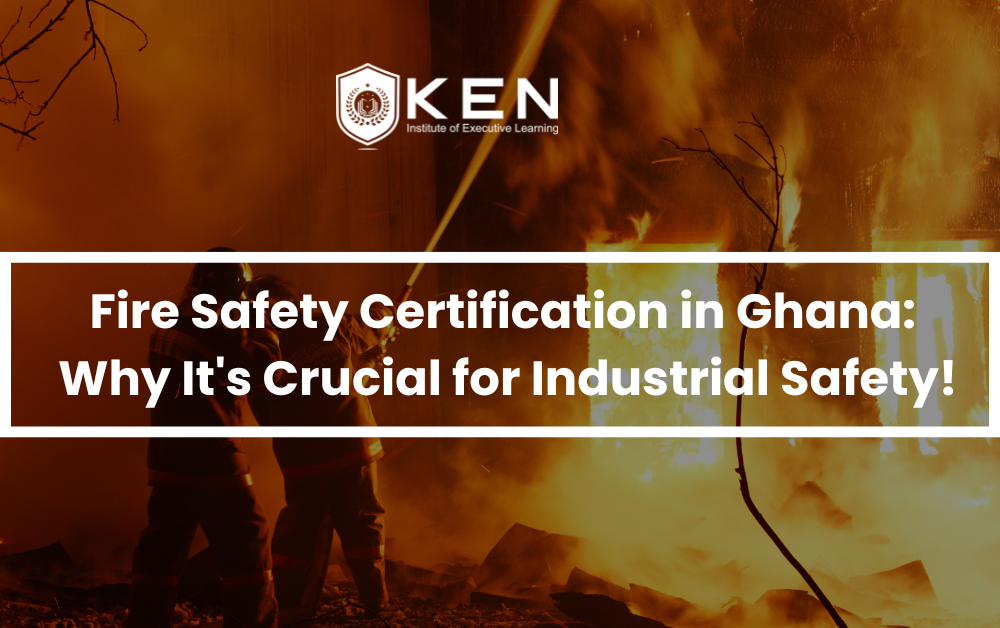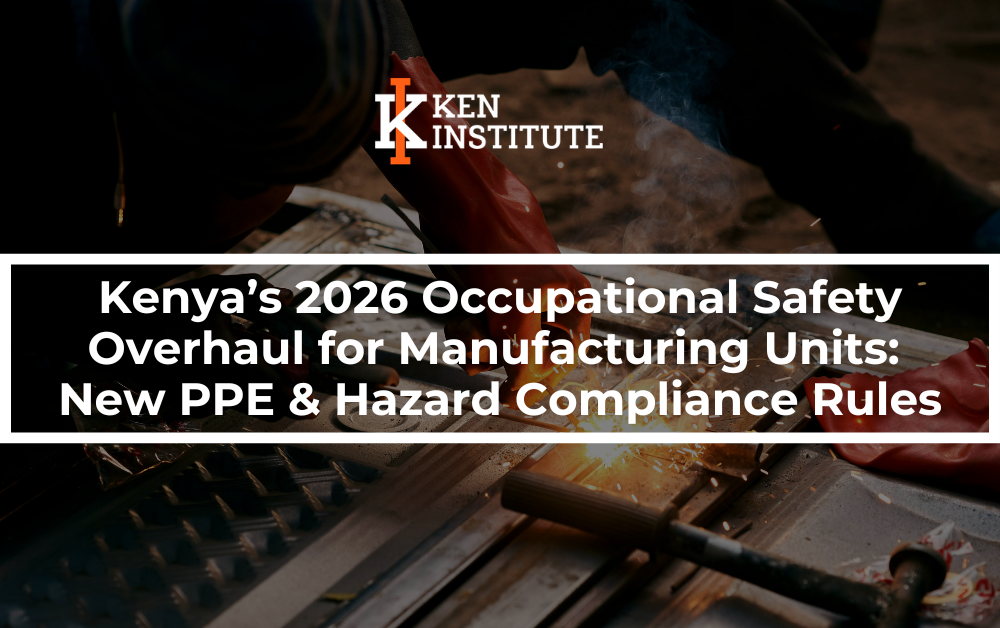Fire Safety Certification in Ghana is a critical pillar of industrial and commercial safety. It is an official document issued by the Ghana National Fire Service (GNFS), confirming that a building or industrial facility complies with Ghana’s fire safety standards. It’s mandatory for various sectors including:
- Manufacturing & industrial plants
- Commercial buildings (malls, hotels, offices)
- Educational institutions
- Hospitals and clinics
- Warehouses and fuel stations
Data & Trends
- According to GNFS, over 600 fire incidents occurred every year, many linked to uncertified or poorly equipped facilities.
- Common causes included:
- Overloaded electrical circuits
- Flammable materials stored unsafely
- No alarm or response system

Why Industries Need Fire Safety Certification in Ghana
| Key Benefit | Details |
| Safety and Preparedness | Reduces risk, saves lives, and curtails property
damage through early hazard detection and control. |
| Regulatory Alignment | Avoids fines, sanctions, legal battles, or forced
closures. Supports Ghana’s goal of safer work environments. |
| Business Resilience | Enables insurance eligibility and supports continued operations post-incident. |
| Life Protection | Ensures building occupants have time and tools to escape or fight fires. |
| Asset Safety | Reduces property damage from preventable fires. |
| Regulatory Shield | Keeps businesses legally compliant and operating. |
| Financial Safety | Facilitates insurance coverage and claim eligibility. |

Fire safety certification in Ghana is essential for:
- Legal compliance under L.I. 1724,
- Ensuring life and asset protection,
- Maintaining insurance coverage and business continuity,
- And benefiting from a faster, digitized permit system.
The key factors why Fire safety certification in Ghana matters
-
Legal Compliance & Regulatory Enforcement
- Per Legislative Instrument L.I. 1724 (2003), owners or occupiers of public, industrial, educational, or healthcare premises are legally required to obtain a fire safety certificate from the Ghana National Fire Service (GNFS).
- GNFS actively inspects, educates, and sanctions non‑compliant facilities—even threatening closures or legal action
- In 2023, the GNFS warned it would clamp down on commercial buildings lacking certification, underscoring how seriously Ghana enforces this requirement
Image Source: https://www.scribd.com/
Governing Law:
Enforcement by GNFS:
- The GNFS conducts inspections, fire audits, and approvals.
- They are empowered to:
- Refuse occupancy
- Seal off non-compliant premises
- Prosecute owners for endangering lives
Recent example:
In 2023, the GNFS threatened legal action against numerous Accra-based businesses that failed to renew their fire certificates.
“Certification isn’t optional—it’s a legal must. Non-compliance can disrupt operations or result in shutdowns.”

-
Protection of Life, Property & Business Continuity
- Certified premises must comply with key safety measures: escape routes, fire alarms, detectors, sprinklers, and extinguishers .
- Regular inspections confirm these systems are installed and working—driving down risk and improving emergency response readiness.
- Insurance providers often require valid fire certificates to underwrite and pay out claims, making certification crucial for risk protection.
Certification minimizes fire hazards, protects occupants, and ensures businesses stay operational during emergencies.
- A. Prevention of Industrial Accidents
Certified facilities must have:
- Fire alarm systems
- Smoke detectors
- Fire extinguishers (properly serviced)
- Accessible emergency exits and fire hydrants
This reduces risks from flammable materials, faulty electrical systems, and unsafe machinery.
- B. Emergency Preparedness
- Fire drills and staff training are often required for certification.
- Ensures workers know evacuation routes and fire suppression techniques.
- C. Business Continuity and Insurance Claims
- Insurance companies often demand valid fire certificates before issuing policies or processing claims after a fire.
- No certificate = claim denial = financial loss.

-
Efficiency via Modernized Permit Systems
- Ghana has launched an Automated Fire Permit & Certification Management System to streamline approvals
- Turnaround times for low-risk buildings have dropped from ~15 days to just 5 days, reducing compliance headaches
- Over 300 GNFS officers have been trained nationwide to support digital certification processes
-
Digitization of the Permit System
To tackle delays and bureaucracy, GNFS launched a digital fire permit system in 2023:
- Applications and inspections now handled online.
- Reduced approval time for low-risk buildings: from 15 days → 5 days.
- Trained over 300 GNFS officers to manage the system.
Image Source: https://www.youtube.com/
Digitization is eliminating bureaucracy, making certification faster, more transparent, and easier to manage.
Quick Overview of Certification Steps
- Submit building plans (site/layout/floor) to GNFS
- Undergo inspection & submit fire-engineering designs.
- Classified by risk—low, medium, or high.
- Receive approval and certificate within approx. 5 days (low-risk)
- Application Submission
- Via the GNFS office or the new Automated Fire Permit System
- Includes architectural plans, fire system design, building use details.
-
Site Inspection
- GNFS officers inspect physical structures, fire exits, and installed systems.
-
Classification
Buildings are classified into:
- Low Risk (e.g., small offices)
- Medium Risk (schools, hotels)
- High Risk (factories, fuel stations)
Industries at High Risk (Must Prioritize Certification)
- Oil & Gas depots
- Textile & garment factories
- Chemical manufacturing plants
- Food processing units
- Cold storage and warehouses
These often involve flammable materials, heat sources, or complex machinery—making fire risk high.
-
Fire Report Issuance
If the premises pass, a certificate is issued, valid for one year.
Consequences of Not Being Certified
| Risk | Impact |
| Legal Sanctions | Court summons, fines, or business closure |
| Fire Hazard | Greater chance of uncontrollable fires |
| Insurance Voidance | Claims denied, increasing financial loss |
| Public Image Damage | Reputational risk if customers or workers are harmed |
Choosing the Right Fire safety training Provider
While selecting the Right Fire safety training Provider you should consider following factors:
- Your sector of interest
- Illegibility of the Certification provided
- Need for your dream job
- Course depth
- Location
Summary
For industrial operators and commercial facility owners in Ghana, obtaining GNFS certification is not only a regulatory requirement but a smart investment in safety, resilience, and sustainable operations.
Join KEN INSTITUTE today in making the workplace a safer and healthier space for everyone. Subscribe to our blog for regular updates, share your experiences, and engage in discussions.
Our shared goal is to improve work environments and foster a culture of safety. Let’s work together to make a tangible difference in the field of occupational health and safety.
Connect now and take the next step toward professional excellence!
Get in touch with us at: info@keninstitute.com
Visit our website: www.keninstitute.com
Call us on +917569034271
Let’s connect together on: Facebook, YouTube, LinkedIn, and Instagram.


